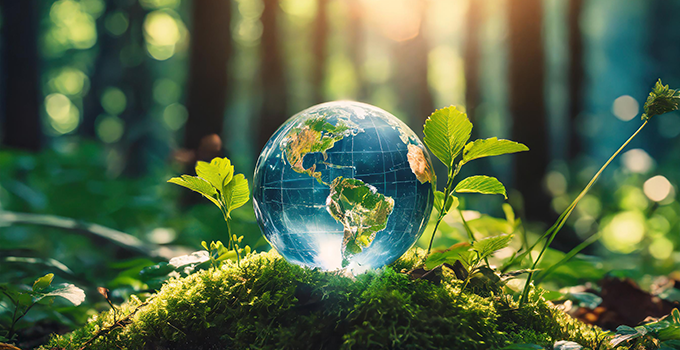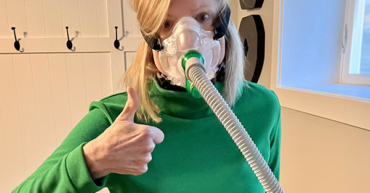April 17, 2024
Make Every Day Earth Day

By Julie Gregory, Chief Health Liaison for Apollo Health
April 22nd marks the 54th celebration of Earth Day. Yet, we live with the dismal fact that our poor caretaking of planet Earth has led to ecological damage that is harming our health. Sadly, the air that we breathe, the water that we drink, and the food that we eat have become increasingly toxic, contributing to chronic diseases — including Alzheimer’s.
By becoming more environmentally aware, we can change our behavior to reduce the amount of pollution and waste we generate while radically transforming our own health.
We all have a “carbon footprint.” This is the amount of harmful greenhouse gasses (including carbon dioxide and methane) that result from our actions. Globally, the average annual carbon footprint is around 4 tons, whereas in the United States, the average is a whopping 16 tons, offering significant room for improvement.
The decision to “go green” is a gradual process for most people. Any action that we take towards a sustainable lifestyle that makes a positive impact on the environment will help to optimize our own health while protecting our beautiful planet for generations to come.
Tips to care for the Earth and your Health
1) Ditch single-use plastic The biggest offender is water bottles that contain toxic “forever” chemicals (including BPA) that are difficult to fully detoxify from your body and have been linked to endocrine disease, cancer, and more. These water bottles take hundreds of years to degrade in a landfill, all the while leaching these same chemicals into the ground, which ultimately make their way to our water and food supplies. Even more frightening, new research shows that the water in these plastic bottles is loaded with harmful nanoplastics. These minuscule particles can invade individual cells and tissues in major organs, interrupting cellular processes while depositing harmful chemicals and heavy metals. While staying hydrated on the go is important, consider carrying stylish stainless-steel water bottles filled with your own clean filtered water instead. See an example of an insulated stainless steel water bottle here.
2) Swap out plastic straws If you’ve grown used to using a straw (to minimize teeth stains, protect your lip gloss, or just to make sipping your beverage easier) be aware that plastic straws come with the same toxic risks as water bottles. There’s no need to give up your straw. Simply swap with a stainless-steel straw that you can easily slip into your bag when you’re on the go. You can see the straws I use here.
3) Boycott coffees-to-go Where to start? Depending upon your unique order, coffee to-go can be laden with unhealthy sugars, chemical flavoring, and more. They’re often high in aluminum (from the heating element) and rarely made with clean filtered water. Even worse, to-go coffee cups are lined with plastic, which when broken down by the hot coffee leaches toxic chemicals and microbeads of plastic into the beverage. The cups and lids are not recyclable and contribute to our microplastic crisis. Instead, make your own toxin-free coffee at home using clean, filtered water in a stainless-steel French press or by using the pour-over method with a stainless-steel filter. If you need a bit of sweetness, add a sprinkle of pure stevia or monk fruit sweetener. If you’re on the go, pour into an insulated stainless-steel container. You can often use the same one for water and coffee. Here is an example of a safe French press and pour-over coffee maker.
4) Shop for organic produce We all know about the health hazards from toxic herbicides and pesticides. By purchasing organic produce, you’re not only protecting yourself and your family, but also sending a message to corporate farmers that you are rejecting their harmful practices. Because organic vegetables and fruits are often more costly than corporate-grown, you can choose to economize by focusing on organic options only when it comes to the most toxic produce. Every year, we create our own KetoFLEX 12/3 “Dirty” list based on the Environmental Working Group’s Dirty Dozen. Our list only includes compliant, low glycemic options and also includes produce that is otherwise genetically modified, which has also been associated with endocrine concerns, cancer, oxidative stress, gut microbiome disruption, etc.
KetoFLEX 12/3 “Dirty” List (Buy USDA Organic)
● Spinach
● Kale, collard & mustard greens
● Bell & hot peppers
● Green beans
● Zucchini (otherwise GMO)
● Soy (otherwise GMO)
● Beets (otherwise GMO)
● Blueberries
● Strawberries
● Cherries (tart cherries only)
● Apples (tart only, such as Granny Smith, small serving)
● Pears (small serving)
5) Eat seasonally By eating vegetables and fruits that are local and in-season, you are consuming the freshest, most nutrient-dense produce. This also helps to minimize your carbon footprint by reducing the need for transportation across the country or even internationally. Because all produce is available year-round, it can be tricky to determine which is in season locally; see this seasonal food guide to determine what’s in season near you.
6) Go meat-free once a week You can reduce your anti-aging methionine intake while protecting the planet by giving up meat once a week. While carefully chosen animal protein can be very healthful, it takes considerably more energy to produce animal protein compared to plant protein. That’s even true if you’re consuming clean proteins like wild-caught seafood and grass-fed beef. Experiment by combining non-starchy vegetables with phytonutrient-rich complete plant proteins to make delicious salads, soups, stews, bowls and more. For those who prefer to avoid animal protein, see KetoFLEX 12/3 for Vegans and Vegetarians for guidance on how to safely practice this dietary option.
7) Use your crockpot A crockpot uses much less energy than your oven. It also enables you to safely cook your family’s dinner while away from home without heating up your house. By slowly cooking your meals on low heat with plenty of liquid, you’re also avoiding advanced glycation end products (AGEs), which are associated with many harmful health consequences, including cardiovascular disease and dementia. NOTE: Some are raising concerns about heavy metals (particularly lead) that may leach from ceramic crockpot liners. To be safe, consider testing yours with this lead testing kit. If you need a replacement, those with stainless steel liners are always free from lead and other toxins.
8) Go TV-free one day per week Try to commit to going without TV one day a week. TVs (and computers) consume a considerable amount of energy and encourage you to be sedentary. Use the time that you would spend watching TV, taking a hike, riding a bike, or socializing with friends.
9) Take the stairs You can reduce your carbon footprint by taking the stairs instead of an elevator or escalator. This is also an excellent opportunity to improve your cardiovascular health. Research shows that two minutes of daily stair climbing is enough exercise to offset the extra pound of weight that the average American gains each year.
10) Run your errands on foot If you’re within walking distance of your local grocery, farmer’s market, or favorite restaurant, put on your comfortable shoes and enjoy walking instead of wasting energy always driving. If you live in a more rural area, you may want to experiment with parking in a central location in your shopping/dining district and experiment with running errands on foot instead of relying on your car to get to each destination. This will not only reduce your carbon footprint but is an excellent way to increase your exercise and time spent outdoors.
11) Recycle Become familiar with your local recycling ordinances. Make this habit intuitive by keeping separate trash bins in your kitchen for recycling and garbage. Those with a garden may also wish to keep a compost container.
12) Properly dispose of household items We’ve all been guilty of tossing a dead battery in the trash. Be aware that the chemicals from that battery — cadmium, lead, lithium, or sulfuric acid — will make their way into our waterways and food supply. This is true of unneeded pharmaceuticals, and other harmful substances like paint, paint thinners, etc. Please contact your local solid waste management officials to learn how to safely dispose of these items.
By caring for the Earth, you are caring for yourself and protecting our precious resources for your children and grandchildren. If all of us adopted some of these small changes, we could make a collective difference and serve as role models to those around us.




